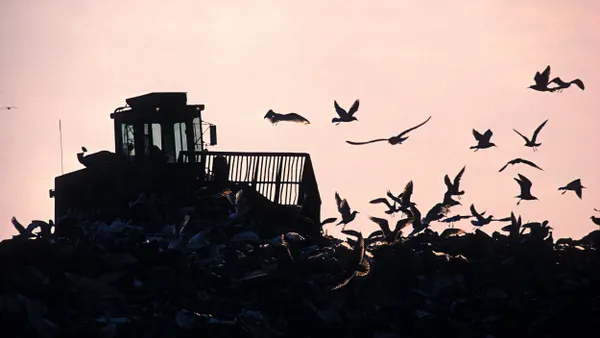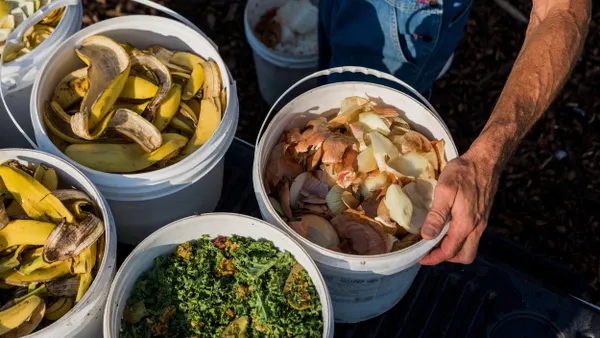Dive Brief:
- New Jersey Gov. Phil Murphy late last week conditionally vetoed A3726, a bill that would have ostensibly required large food waste generators to begin diverting organics from disposal next year.
- Murphy took issue with two "glaring exceptions" to the list of authorized recycling facilities, which he said in a veto message "severely weakened" the bill's otherwise "admirable" intentions. Language allowing material to go to landfills (with gas capture systems) and incinerators (that used anaerobic digestion within four years) was struck entirely.
- The move was announced in a joint press release by Murphy, the bill's original sponsor Sen. Bob Smith and environmental groups. Smith, who said in July he only supported the disposal-related amendments to secure passage, told NJ.com he supports the bill as outlined by the governor.
Dive Insight:
Smith has been pushing some version of this bill since at least 2015, often running into roadblocks due to the complexities of New Jersey's waste system.
Initial opposition came from county governments, which own much of the state's landfill infrastructure and also, in many cases, have flow control. When the legislation evolved to include exemptions for landfills with gas capture systems, organics recyclers signaled their opposition – as did Covanta. The New Jersey-based company operates three of the state's four active incinerators.
This stalemate appeared unbreakable until earlier this summer, when activity suddenly kicked up on the bill in the final weeks of the legislative session.
In the end, following multiple amendments, the bill listed landfills with gas capture and incinerators as authorized recycling facilities. The inclusion of the phased in anaerobic digestion requirement in connection with the incinerators is confusing to many. Covanta doesn't own or operate any such facilities, and hasn't confirmed any interest in doing so.
Beyond these carve-outs, the bill was viewed as generally positive by environmental groups and organics recyclers. Requiring entities generating 52 tons or more per year to start diverting organics by Jan. 2020 is a faster timeframe than usual for such policies. The establishment of a Food Waste Recycling Market Development Council, state procurement requirements for compost and other provisions were all welcomed.
Still, many were concerned that this would all be outweighed by effectively locking in the status quo rather than encouraging investment in new composting or digestion projects. Development is underway on multiple projects, due in part to expanding organics diversion requirements in New York – but the pace has been slow.
The trade associations and environmental groups raising these concerns appear to have gotten Murphy's attention over the summer.
In addition to striking the language around landfills and incinerators, Murphy's veto also inserts a provision stating local organics recycling facilities must be notified of any generator attempting to get a disposal waiver in their area. Under the original bill, as is common in other states, generators can petition for such permission if they aren't able to find a cost-effective, authorized facility within 25 road miles.
Following Murphy's conditional veto, it's up to the state legislature to decide whether to re-enact the bill with his recommended amendments. If so, he can be expected to sign the bill into law, and the state could join six others with some form of organics diversion requirements. However, given New Jersey's political environment and provincially-driven waste infrastructure, that is far from guaranteed.
Correction: A previous version of this article stated Covanta operates four incinerators in New Jersey. Following the closure of one facility, the company now operates three.











